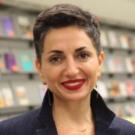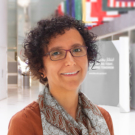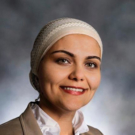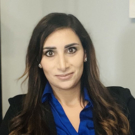Speakers

Lina AbiRafeh
Senior Advisor for Global Women’s Rights, Arab Institute for Women
Lebanese American University

Isis Nusair
Associate Professor of Women’s Studies and International Studies
Denison University

Marwa M. Shalaby
Assistant Professor in Gender and Women’s Studies and Political Science
University of Wisconsin-Madison
Moderator
About the Webinar
On March 10, Arab Center Washington DC (ACW) held a webinar titled “Do Arab Women Have Reason to Celebrate this International Women’s Day?” Speakers were Lina AbiRafeh, Senior Advisor for Global Women’s Rights, Arab Institute for Women, Lebanese American University; Yara M. Asi, Assistant Professor, University of Central Florida, and ACW Nonresident Fellow; Isis Nusair, Associate Professor of Women’s Studies and International Studies, Denison University; and Marwa M. Shalaby, Assistant Professor in Gender and Women’s Studies and Political Science, University of Wisconsin-Madison. Tamara Kharroub, ACW Deputy Executive Director and Senior Research Fellow moderated the webinar.
Lina AbiRafeh said that on International Women’s Day, women continue to do what they do everyday but without much change in the status of their rights. Women, she asserted, are far away from equality around the world: in education, employment, resources, privileges, and other things. “No country in the world,” she said, “has equality…not even Iceland.” Women are called upon to keep fighting for their rights, but gender differences remain the same. She stressed that no matter the kind of political system—liberal, democratic, autocratic, etc.—women’s rights are lacking. Internationally, AbiRafeh pointed out, two-thirds of people who are illiterate are women, not only because the states do not provide them sufficient opportunities, but because their societies and families restrict their ability to access education. She said, “We are virtually invisible in all aspects of leadership, positions of power, decision-making authority, or political spaces.”
To AbiRafeh, discrimination against women is in laws enacted by states. What perpetuates this situation are poverty, conflict, insecurity, unemployment, and other social ills. In the Arab region, these conditions are simply worse, but not exceptional. In some countries of the Arab world, women are subjected to endemic harassment and forced into marriage at an early age (which basically constitutes child rape). She mentioned that 15 million girls in the Arab region are married each year before they turn 18. Genital mutilation is another problem suffered by women in some Arab societies. She said that COVID and its restrictions fell heavily on the shoulders of women in the Arab world because they are the primary caregivers. If their rights and freedoms were restricted before the pandemic, they were doubly so with it. AbiRafeh ended her presentation extolling the efforts made by young Arab women who are taking up the challenge of change in women’s status in the Arab world. She said that despite all the challenges, their work and activism are inspiring.
Yara M. Asi presented a contextual analysis of the status of women in the Arab world. She said that blaming religions or religious factors for their poor status in the Arab and Muslim worlds is only part of the explanation. All religions have elements that can be blamed. There are other serious contextual factors including urban vs. rural conditions, household types, educational level of parents—particularly fathers—socioeconomic conditions (although some rich countries are not doing better), states and state structures, social norms, and many others. She pointed out that “everybody always talks about the Middle East as a monolith, but look at Beirut, look at the Gaza Strip, they are quite different.” Asi said that History and the colonial legacy in the Arab region are serious factors where the states are rather new structures and are behind on all social indicators.
Asi sees that trauma and conflict impact women the most, and while there are positive trends such as the increase in the number of educated women, these do not end up benefiting in employment or better jobs. They usually are expected to take care of children, care for the elderly, and manage their households without the requisite assistance from family, society, or the state. When women are in the workplace, Asi added, they are subjected to harassment and passed over for promotions. They also cannot access adequate healthcare, have restrictions on their travel, and do not properly use social services if they are available. Asi added that “access to healthcare is variable and is dependent on both the functioning of the country [they] live in as well as the level of egalitarianism in [their] household.” If the men go to war in conflicts, Asi said, women are left alone to fend for themselves and their families. Finally, Asi discussed the serious impact of climate change on women, especially in agricultural societies where the entire family’s wellbeing is contingent on environmental factors.
Marwa Shalaby looked into political factors related to women’s status in the Arab world and highlighted the issue of their participation in governance. She said that while the Arab region is least democratic in the world, there have been better conditions for women’s participation in parliaments and executive branch positions. Many quotas for women’s representation in Arab legislatures have been instituted; and many women were chosen for executive positions in Arab governments. The problem has been, Shalaby said, that many of these changes have been cosmetic in matters of governance. Arab political systems use these quotas to improve their reputations with western countries and to show progress. She pointed to Algeria, Morocco, Libya, and Tunisia as countries that saw that it was necessary after the Arab Spring revolts to allow women to appear to participate in running their countries. Still, however, the numbers remain low in many countries where it is expected to have high ratios of women participating, such as Lebanon.
Shalaby discussed the issue of whether women feel empowered enough to remain engaged in politics through state institutions. She said that research reveals that they do not seem to be very engaged or hopeful, pointing out that “the retention of women in politics is very low…such that the reelection of women is at 2 percent.” Shalaby highlighted the fact that women, like all other aspects in the Arab region, are not a homogenous group and their participation in different states reflects different preferences. They, like men, appear less likely to want to upset the current regimes that do not accept opposition to their policies. The absence of institutionalized political parties is increasing this feeling, in the process adding to the general alienation from serious and purposeful participation. But despite the many obstacles and problems facing Arab women today, Shalaby asserted, it is too late and too costly for Arab regimes to ignore women or their agendas and rights. Despite all the restrictions and hindrances, she said, Arab women keep on fighting to realize those rights.
Isis Nusair started by cautioning against talking about the region as one entity and the need to examine the historic and sociopolitical context in each country. She spoke about the challenges that women’s rights activists face. These relate to the targeting of activists by the state and the appropriation of state feminist agendas, as well as the exchange between states and Islamist parties over control of the public and private spheres as well as women’s bodies for marking these boundaries. She spoke about the tension between universal rights and national laws and between nationalist and feminist agendas. One of the main challenges in her view relates to the ability of women’s rights organizations to focus on grassroots work and bridge the gap between rural and urban spaces and class, ethnic, and educational divides. She stated that that is building from the bottom up.
Nusair also spoke about the reliance on outside funding and the professionalization of many of these organizations. She focused on women’s representation and position within political parties. Despite all these challenges, she concluded that women’s rights activists are doing impressive work on the ground linking generations of activists, combating violence in the public and private spheres, standing with LGBTQ+ rights, insisting on the indivisibility of rights, and challenging hierarchical masculine models of leadership.
According to Nusair, creating democratic spaces where people can organize and reimagine a different present and future, and where they can live in dignity is crucial. Looking at the impact of the COVID pandemic in the region where there is a weak infrastructure, rising unemployment especially among the youth, and now an increase in food prices in basic necessities like wheat in light of the current war in Ukraine pose serious challenges in terms of sustaining life let alone keeping up with the activist work. In addition, the current war in Ukraine showed the hypocrisy and double standards in both media and foreign policy statements and representations of the war and of war refugees. Statements like “the civilized or free world”, “this is not Afghanistan or Iraq, or “these are not your Syrian refugees” are racist to say the least.
Nusair concluded by emphasizing the need to move away from the “add women and stir” approach to foreign policy. Using an integrative and intersectional feminist perspective that links the economic, social and political contexts in which people live will allow for better understanding and transformation to take place. This wholistic approach is part of a continuum that links freedom from violence with the protection of the environment. She urged us to question “world order and security” logics through rethinking the gendered structures of our institutions. We need to challenge hierarchical and patriarchal systems that go beyond equal representation. The number of women at the table does ensure better futures only when women and marginalized groups can influence the decision-making process and set priorities that take their concerns into account. It is crucial that we think about military aid, the military industrial complex, disarmament, and institutionalized violence and how war maintains these power structures in place. It is also important to trace especially now how militarization processes shape our knowledge and the decisions we make. We need to ask about whose rights are being protected, who benefits from these systems, and whether militarized security could actually bring security let alone peace. These questions are also important for thinking about credibility and accountability. Nusair cautioned against despair and insisted on the need to keep working on building local, regional, and transnational alliances, solidarity, and community.


